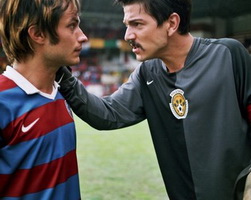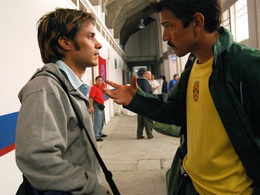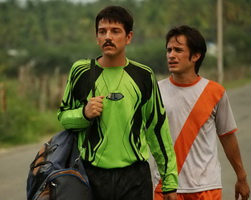For a movie about two guys who play professional soccer for a living, “Rudo y Cursi” has an alarming lack of actual soccer playing in it. It would be easy to label the Mexican import starring Diego Luna and Gael Garcia Bernal as a sports film, but it wouldn’t really be true. Unfortunately, the kind of movie that it actually is isn’t all that original either.
Essentially, Carlos Cuaron (who co-wrote “Y Tu Mamá También” with his brother Alfonso) has directed a typical rise-and-fall picture. Granted, it has loads of local flavor and two appealing leads, but it adds little to the genre and is too melodramatic to rise above.
 The plot is pretty formulaic stuff, as it follows two half brothers who are implausibly plucked out of obscurity by a talent scout (Guillermo Francella) when his car breaks down in the middle of nowhere. Francella’s seedy/philosophical narration is one heavy-handed device in a movie that at least has a clear grasp of its characters—his seedy scout in particular seems to get equal amount of personal pleasure helping his boys to success as he does enjoying the success they have afforded him.
The plot is pretty formulaic stuff, as it follows two half brothers who are implausibly plucked out of obscurity by a talent scout (Guillermo Francella) when his car breaks down in the middle of nowhere. Francella’s seedy/philosophical narration is one heavy-handed device in a movie that at least has a clear grasp of its characters—his seedy scout in particular seems to get equal amount of personal pleasure helping his boys to success as he does enjoying the success they have afforded him.
For American audiences, the cultural mores of a poor extended family living on a banana plantation will be nice window dressing, and “Rudo y Cursi” does a nice job sketching a portrait of extended family living in a small Mexican city.
Their soccer positions are extensions of their actual personalities: Bernal plays the fiesty and temperamental forward who dreams of bigger scores and Luna is the level-headed goalkeeper who must save everybody else. But if this movie ends in a championship showdown between two brothers on opposite teams, I’m going to be really disappointed … aww, man!
 Once they move to the big city, of course, each brother tastes success in their own way while also indulging in self-destructive behavior that will threaten the very success they have always dreamed of. Tato—nicknamed Cursi, played by Bernal—wants to be a pop singer, but seems to be the only person who doesn’t understand he can’t sing. (He does do an atonal traditional Mexican version of Cheap Trick’s “I Want You to Want Me” that’s pretty funny.) The artificial world of showbiz is clearly something that the wide-eyed, trusting lad isn’t ready for either.
Once they move to the big city, of course, each brother tastes success in their own way while also indulging in self-destructive behavior that will threaten the very success they have always dreamed of. Tato—nicknamed Cursi, played by Bernal—wants to be a pop singer, but seems to be the only person who doesn’t understand he can’t sing. (He does do an atonal traditional Mexican version of Cheap Trick’s “I Want You to Want Me” that’s pretty funny.) The artificial world of showbiz is clearly something that the wide-eyed, trusting lad isn’t ready for either.
On the other hand, Beto—nicknamed Rudo, played by Luna—is a father who wants to provide for his wife and child but also has a severe gambling problem. From the first moment he meets a sleazy high-stakes mobster, it’s pretty easy to see where this is all headed, and pretty disappointing to see that that’s exactly how it plays out.
“Rudo y Cursi” certainly benefits from the performances of Luna and Bernal, whose onscreen chemistry has lost nothing since the pair burst on the international movie scene in 2001 in the decidedly more layered and poignant “Y Tu Mamá También.” The good nature they exude is infectious and helps the story over some rough patches for sure.
 The film also scores with its frank and cynical view of Mexican professional sports, where payoffs and egos decide the fate of more games than actual talent does.
The film also scores with its frank and cynical view of Mexican professional sports, where payoffs and egos decide the fate of more games than actual talent does.
The story really is about the bond between brothers against the vibrant and tempting backdrop of Mexico City, so the lack of actual soccer playing doesn’t really hurt the movie all that much, but it is odd when key shots of the main characters seem to be missing right in the middle of an important game while Cuaron cuts to crowd shots. In the end, “Rudo y Cursi” is engaging because of its setting and stars and little else.








{ 4 comments }
You’re missing the point – the point is that it’s obvious where things are going and yet they are too blind to see it coming. Consider that these guys’ other movies almost all have to deal with fate in the universe – it’s no different here. It’s obvious, and unstoppable. Is it because of their personalities?
It’s also a commentary on the state of Mexico today. There’s an enormous pink elephant in the room, and no one talks about it; the failure of Mexico is inside itself, and no one’s willing to look there.
Notice that their whole goal is to build a house for their mom, and they have enough money to do it; but they never do. Instead they get into massive personal problems that are OBVIOUS to everyone but them. It’s like a brick wall that your train is headed toward, and you casually caress the break and then decide to take a nap.
Instead, probably on the best commentary in the whole movie, it’s the drug lord that builds a house for the mom.
The movie’s final message is that narcos are everywhere in Mexico, but the “innocent” population is just as guilty for looking the other way and not doing anything about it.
R – Really insightful stuff you’ve written here. The idea that they are “too blind” to see it coming, however, is in itself an overripe cliche and its done no better here than I’ve seen it a million times before.
On the other hand, I really like your cultural context idea. I can appreciate the movie more for being a criticism of Mexico’s inner turmoil way more than a successful rise-and-fall story. Thanks for the comments!
Well, this was my issue when I saw the film that I think you really hit on: outside of the milieu of present-day Mexico (assuming things get better), is this movie worth anything on its own? Because, tragically, most people that I saw it with in Mexico laughed incredibly hard because so many points hit home. They were trying to show that life for us on a daily basis has now become a cliche; art is now imitting life and it’s ridiculous. But if you remove that layer involving real-life situation, it’s really just another cliche.
Seriously, everything in the movie has happened or could truly possibly happen; case in point:
http://www.washingtonpost.com/wp-dyn/content/article/2008/07/30/AR2008073002977.html
If you take that away then you’re right, it becomes a lame version of what it tried to represent.
Great review of a little-known movie though. Thanks.
Comments on this entry are closed.